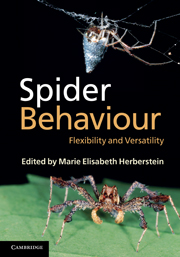Book contents
- Frontmatter
- Contents
- List of contributors
- How this book came about
- 1 Introduction: spider biology
- 2 Flexibility in the foraging strategies of spiders
- 3 Spider webs: evolution, diversity and plasticity
- 4 Flexible use of anti-predator defences
- 5 Communication
- 6 Deceptive signals in spiders
- 7 Mating behaviour and sexual selection
- 8 Group living in spiders: cooperative breeding and coloniality
- 9 Plasticity, learning and cognition
- 10 Kleptoparasitic spiders of the subfamily Argyrodinae: a special case of behavioural plasticity
- Index
- Plate section
- References
5 - Communication
Published online by Cambridge University Press: 05 June 2012
- Frontmatter
- Contents
- List of contributors
- How this book came about
- 1 Introduction: spider biology
- 2 Flexibility in the foraging strategies of spiders
- 3 Spider webs: evolution, diversity and plasticity
- 4 Flexible use of anti-predator defences
- 5 Communication
- 6 Deceptive signals in spiders
- 7 Mating behaviour and sexual selection
- 8 Group living in spiders: cooperative breeding and coloniality
- 9 Plasticity, learning and cognition
- 10 Kleptoparasitic spiders of the subfamily Argyrodinae: a special case of behavioural plasticity
- Index
- Plate section
- References
Summary
A spider's life is guided by sensory information completely alien to human observers unless specialised equipment is applied. Even in the case of spiders guided by vision, a sensory mode that humans can boast great acuity in, a large body of evidence suggests that spiders are most sensitive to ultraviolet light, light completely imperceptible to humans. The spider's world is thus unknown and only in the last two decades have researchers begun to make strides into understanding these fascinating creatures. Communication research has been a critical piece of the puzzle in our embryonic understanding of spiders. Although spiders generally live a solitary life, it has long been accepted that communication plays an important role throughout their lifetime. Spiders are now the subjects of intensive scientific research as it becomes more and more obvious that their communication systems are unique, highly complex, plastic and versatile.
Introduction
Generally, communication takes place when a signal is sent from one individual to another that alters the pattern of behaviour or the physiology in another organism (Wilson, 1975). Three processes are required for communication: the production of a signal or cue by a sender, its propagation through the environment via a transmission channel, and appropriate receptor sites to detect the signal by the receiver. The transmission channels used by spiders are chemical, tactile, acoustic and visual channels (Weygoldt, 1977, Witt and Rovner, 1982).
Information
- Type
- Chapter
- Information
- Spider BehaviourFlexibility and Versatility, pp. 127 - 189Publisher: Cambridge University PressPrint publication year: 2011
References
Accessibility standard: Unknown
Why this information is here
This section outlines the accessibility features of this content - including support for screen readers, full keyboard navigation and high-contrast display options. This may not be relevant for you.Accessibility Information
- 74
- Cited by
